Luna® Probe One-Step RT-qPCR 4X Mix with UDG
Product information| Code | Name | Size | Quantity | Price | |
|---|---|---|---|---|---|
M3019S |
Luna Probe One-Step RT-qPCR 4X Mix with UDG |
200 rxns ( 4 X ) | - | Unavailable in your region | |
M3019L |
Luna Probe One-Step RT-qPCR 4X Mix with UDG |
500 rxns ( 4 X ) | - | Unavailable in your region | |
M3019X |
Luna Probe One-Step RT-qPCR 4X Mix with UDG |
1000 rxns ( 4 X ) | - | Unavailable in your region | |
M3019E |
Luna Probe One-Step RT-qPCR 4X Mix with UDG |
2000 rxns ( 4 X ) | - | Unavailable in your region |
Luna® Probe One-Step RT-qPCR 4X Mix with UDG
Catalog #M3019
Product Introduction
The Luna Probe One-Step RT-qPCR 4X Mix with UDG enables sensitive detection of target RNA sequences with robust performance in multiplex applications of up to 5 targets. This product is also offered in a No ROX formulation for instruments that do not require the ROX passive reference dye and in a lyophilized format for streamlined assay development.
- Simplify your reaction setup with a single-tube master mix format
- Increase sensitivity of your RT-qPCR, as 4X concentration allows for more sample input
- Maximize your throughput by multiplexing up to 5 targets
- Luna WarmStart® RT paired with Hot Start Taq increases reaction specificity and robustness, enabling room temperature setup
- Reduce risk of carryover contamination with thermolabile UDG and dUTP included in the mix
- Eliminate pipetting errors with non-interfering, visible blue tracking dye
- Learn how NEB is supporting COVID-19 research with a variety of RT-qPCR virus detection options
- Product Information
- Protocols, Manuals & Usage
- Tools & Resources
- FAQs & Troubleshooting
- Citations & Technical Literature
- Quality, Safety & Legal
- Other Products You May Be Interested In
Product Information
Description
The Luna Probe One-Step RT-qPCR 4X Mix with UDG is designed for real-time detection of target RNA sequences using hydrolysis probes. In a single tube, RNA is first converted to cDNA by a reverse transcriptase, then a DNA-dependent DNA polymerase amplifies the cDNA, enabling quantitation via real time or quantitative PCR (qPCR). Probe-based qPCR/RT-qPCR monitors an increase in fluorescence upon 5′ to 3′ exonuclease cleavage of a quenched, target-specific probe to measure DNA amplification at each cycle of a PCR. At a point where the fluorescence signal is confidently detected over the background fluorescence, a quantification cycle or Cq value can be determined. Cq values can be used to evaluate relative target abundance between two or more samples.
Due to the one-step RT-qPCR workflow and probe-based detection chemistry, a comparison can be made to the Luna Probe One-Step RT-qPCR Kit (NEB #E3006).
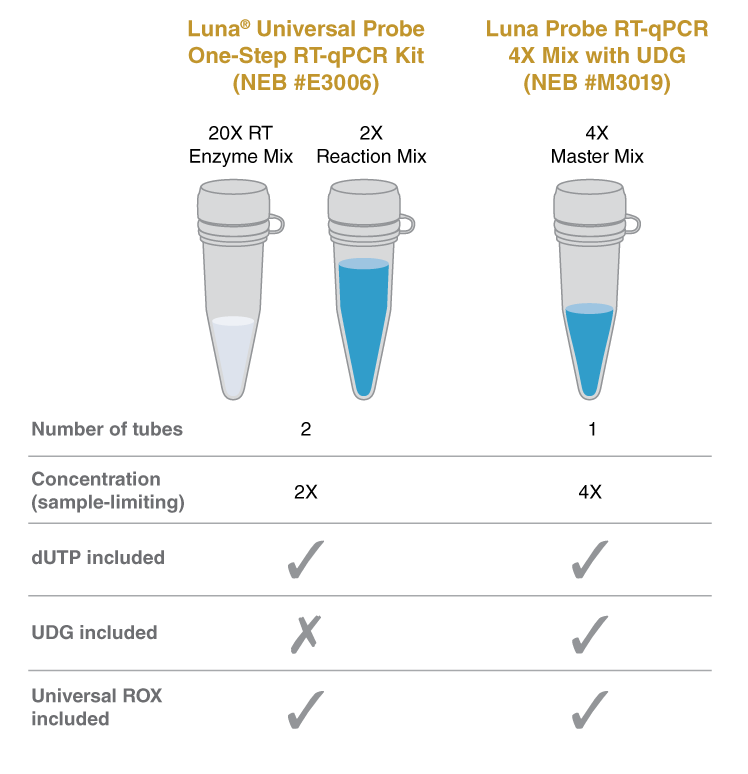
The Luna Probe One-Step RT-qPCR Mix with UDG is supplied at a 4X concentration and enables higher amounts of sample input, which is relevant for applications where RNA present in low abundance is of interest, such as pathogen detection. Performance in multiplexing applications has been optimized, with sensitive, linear detection achieved for up to 5 targets across a range of inputs. The mix consolidates the necessary components for one-step RT-qPCR into a single tube, including Luna WarmStart RT, Hot Start Taq DNA Polymerase, dNTPs, and Murine RNase Inhibitor in an optimized buffer. Combining Hot Start Taq DNA Polymerase with a novel, WarmStart-activated reverse transcriptase allows for dual control of enzyme activity via reversible, aptamer-based inhibition. This temperature-dependent activation helps to prevent undesirable non-specific priming and extension prior to thermocycling, providing added security for setting up reactions at room temperature. The engineered Luna WarmStart RT also possesses higher thermostability than many other RTs, allowing an optimal reaction temperature of 55°C. Additionally, the mix is formulated with a unique passive reference dye that is compatible across a variety of instrument platforms, including those that require a high or low ROX reference signal.
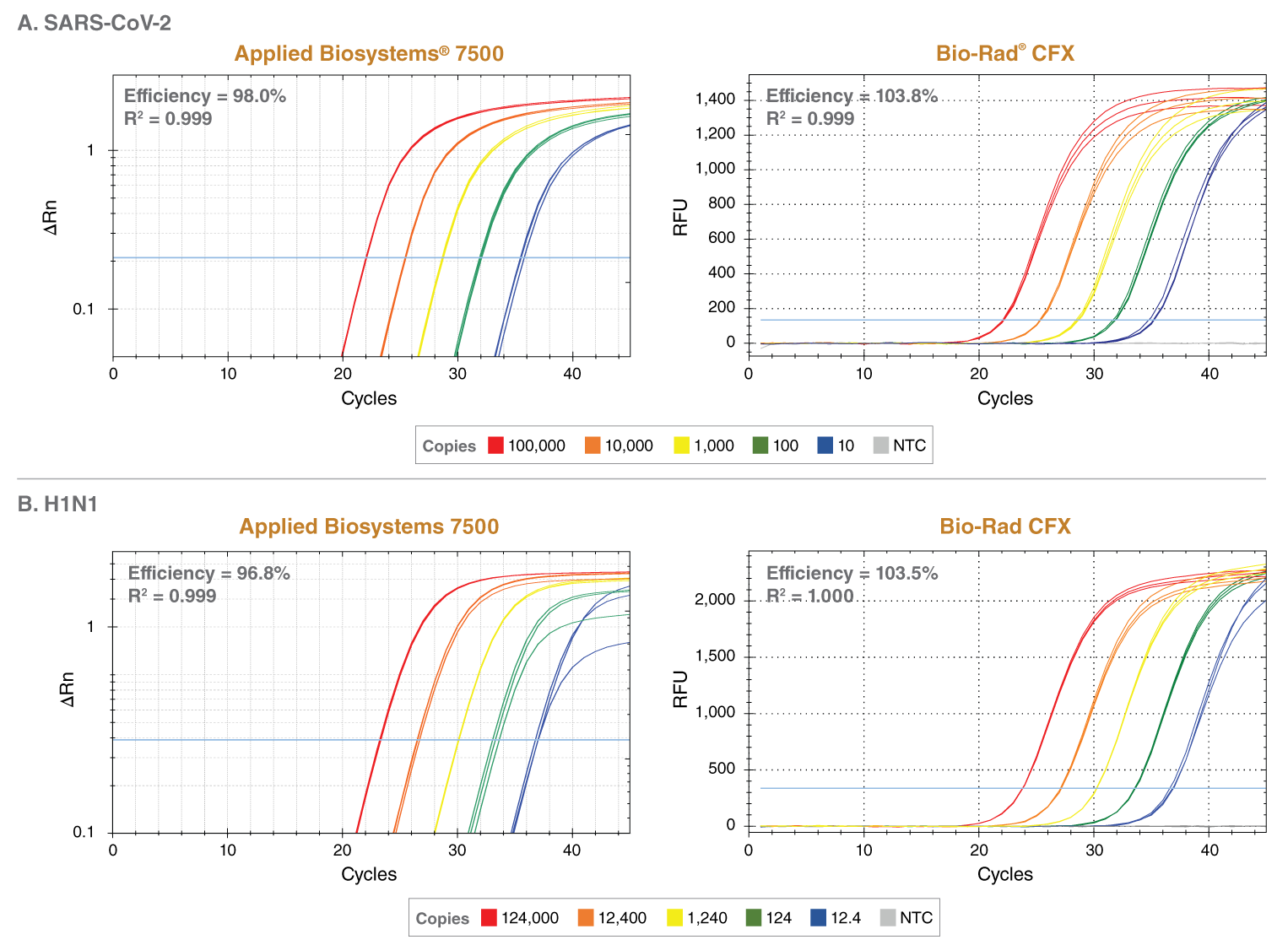
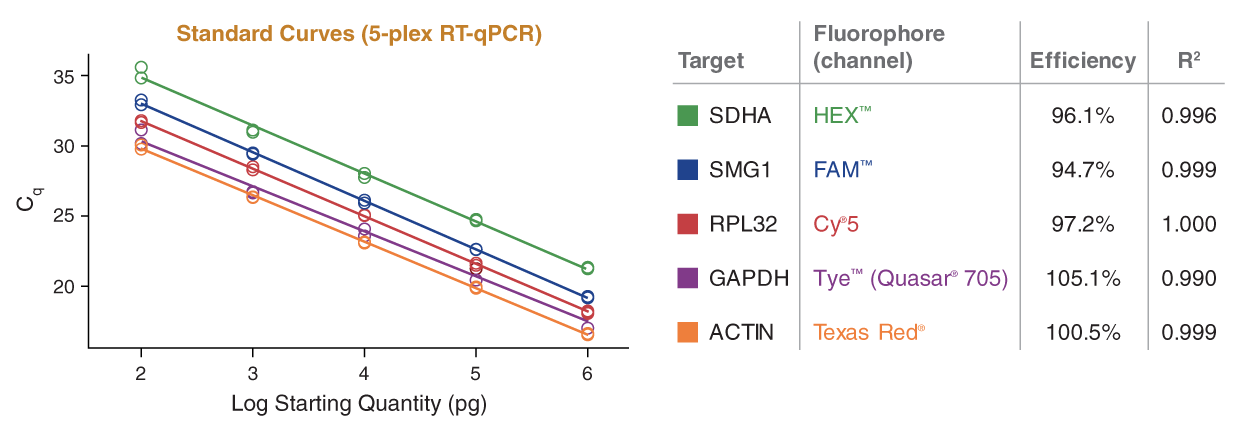
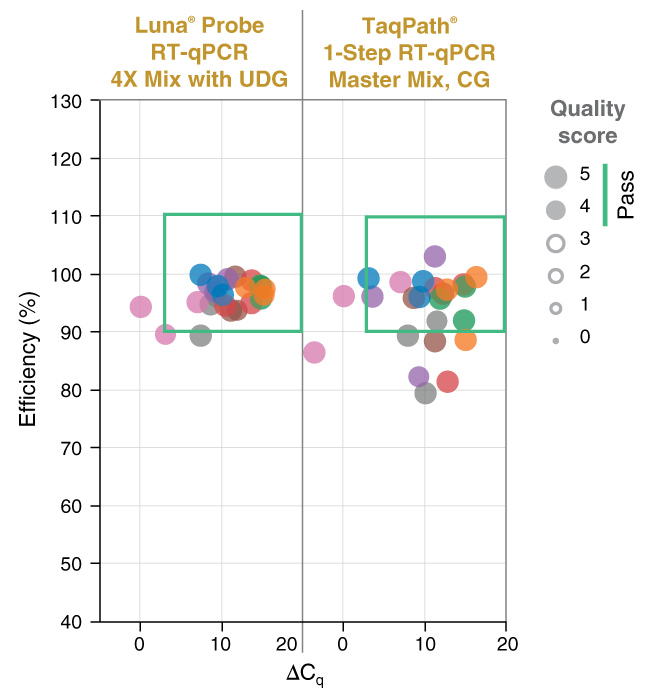
The sensitivity of RT-qPCR makes it important to minimize DNA contamination wherever possible. The inclusion of dUTP and thermolabile UDG prevents carryover contamination, where unintended product of a previous amplification can serve as the substrate of a subsequent reaction. The thermolabile UDG is completely inactivated at temperatures above 50°C, thereby having no effect on qPCR performance.
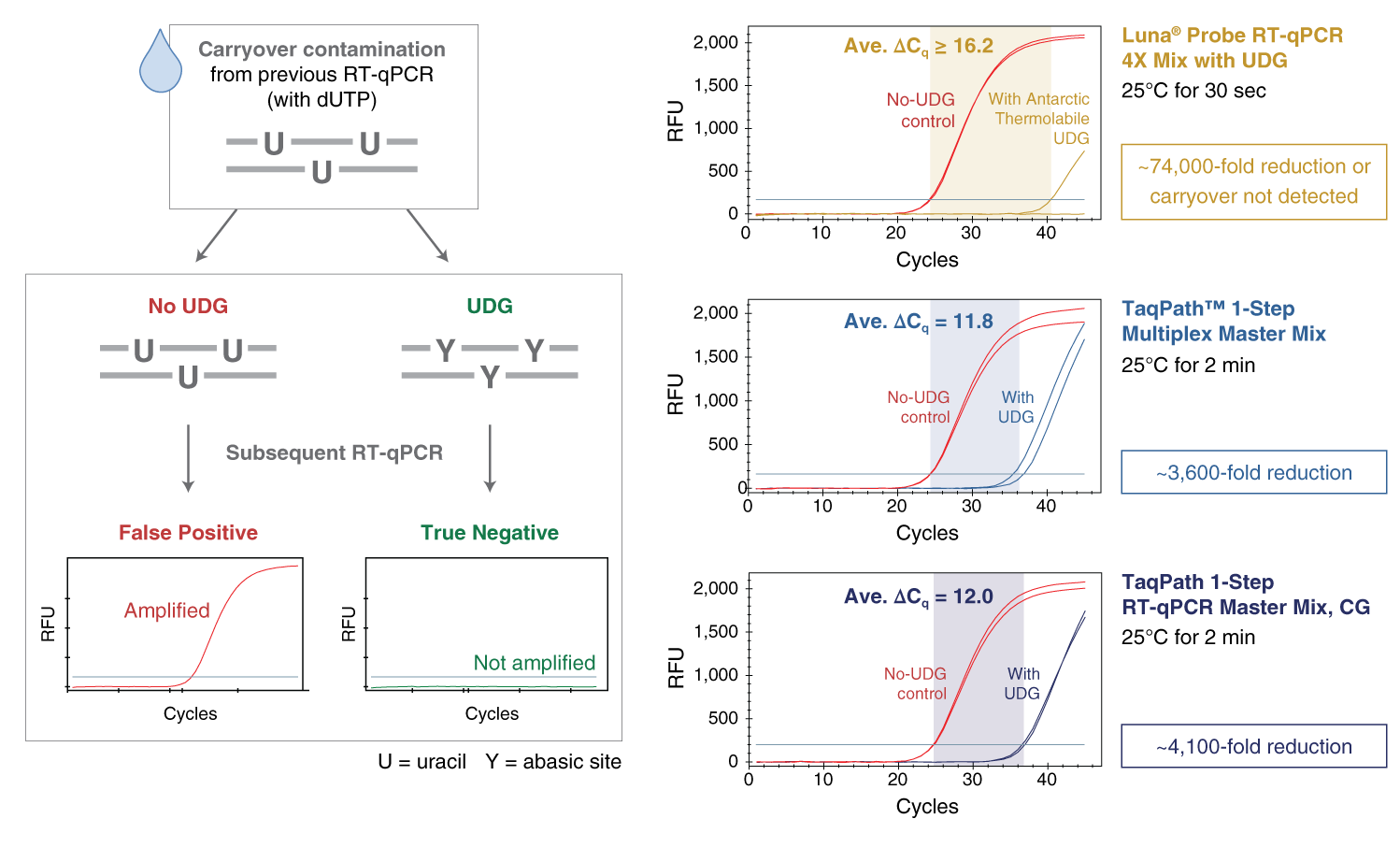
A non-fluorescent visible blue tracking dye is included to assist in pipetting into clear vessels. The tracking dye does not overlap spectrally with fluorophores commonly used in qPCR and does not interfere with real-time detection.

- This product is related to the following categories:
- Luna® qPCR & RT-qPCR
- This product can be used in the following applications:
- qPCR & RT-qPCR
Properties & Usage
Related Products
Companion Products
Protocols, Manuals & Usage
Protocols
Application Notes
- The Luna 4X RT-qPCR Mix and Luna SARS-CoV-2 RT-qPCR Multiplex Assay Kit enable high throughput, automated detection workflows
- Optimized conditions for the CDC Influenza SARS-CoV-2 (Flu SC2) Multiplex Assay using Luna One-Step RT-qPCR Reagents
- Facilitating Purification and Detection of Viral Nucleic Acids from Milk
Tools & Resources
Web Tools
FAQs & Troubleshooting
FAQs
- How do I use qPCR to determine the concentration of my material?
- Can I set up my Luna® RT-qPCR at room temperature?
- Should I use probe- or dye-based detection for my qPCR assays?
- How should I design primers for Luna® qPCR?
- How long should my amplicon be for qPCR?
- Why is the Luna® qPCR Mix blue? Will this dye interfere with detection?
- Can I run the Luna® qPCR Mix on my qPCR instrument?
- Can I use fast instrument settings with the Luna® qPCR Mix?
- Do I need to add ROX?
- What RNA samples can be used in RT-qPCR with the Luna® Mix?
- How much primer and probe should I use with the Luna® Universal Probe qPCR Master Mix?
- Can I use shorter cycling times?
- How much RNA template should I use in my RT-qPCR reaction?
- Can I run multiplex reactions with the Luna® Probe One-Step RT-qPCR Kits? Do I need to change my reaction conditions?
- Can I use a ROX-labeled probe with the Luna® Probe Mixes that contain a universal ROX reference dye?
- Can alternative probe based detection strategies be used with the Luna® Probe Mix?
- What temperature should I use for cDNA synthesis with Luna® RT-qPCR kits?
- Can I use longer targets in one-step RT-qPCR?
- Is the Monarch® Total RNA Miniprep Kit compatible with Luna® RT-qPCR Reagents?
- Are the Monarch Spin RNA Cleanup Kits compatible with Luna RT-qPCR reagents?
- What are the differences between the Luna One-Step RT-qPCR products (NEB #E3006, #E3007, #M3019, #M3029 and #L4001)?
- Other companies recommend a 2-min incubation at 25°C for carryover prevention, is a 30-sec incubation at 25°C sufficient?
- How can I perform a no-RT Control?
- Can I use the Luna Probe RT-qPCR mixes for viral detection?
Citations & Technical Literature
Citations
Additional Citations
Quality, Safety & Legal
Quality Assurance Statement
Quality Control tests are performed on each new lot of NEB product to meet the specifications designated for it. Specifications and individual lot data from the tests that are performed for this particular product can be found and downloaded on the Product Specification Sheet, Certificate of Analysis, data card or product manual. Further information regarding NEB product quality can be found here.Specifications
The Specification sheet is a document that includes the storage temperature, shelf life and the specifications designated for the product. The following file naming structure is used to name these document files: [Product Number]_[Size]_[Version]Certificate Of Analysis
The Certificate of Analysis (COA) is a signed document that includes the storage temperature, expiration date and quality controls for an individual lot. The following file naming structure is used to name these document files: [Product Number]_[Size]_[Version]_[Lot Number]- M3019E_v1_10086188
- M3019S_v1_10083018
- M3019X_v1_10083022
- M3019S_v1_10105787
- M3019E_v1_10105176
- M3019L_v1_10107199
- M3019X_v1_10107200
- M3019S_v1_10108249
- M3019E_v1_10108244
- M3019L_v1_10109897
- M3019E_v1_10111866
- M3019L_v1_10111050
- M3019L_v1_10116524
- M3019X_v1_10117878
- M3019L_v1_10118240
- M3019L_v1_10120893
- M3019L_v1_10121214
- M3019X_v1_10118241
- M3019E_v1_10120298
- M3019E_v1_10122640
- M3019S_v1_10123462
- M3019X_v1_10123082
- M3019E_v1_10123103
- M3019X_v1_10125213
- M3019L_v1_10123083
- M3019L_v1_10125064
- M3019X_v1_10131110
- M3019E_v1_10083030
- M3019X_v1_10132781
- M3019L_v1_10131847
- M3019S_v1_10129860
- M3019X_v1_10135526
- M3019L_v1_10135836
- M3019L_v1_10137587
- M3019L_v1_10083020
- M3019E_v1_10131850
- M3019L_v1_10138414
- M3019E_v1_10140705
- M3019S_v1_10140630
- M3019L_v1_10140413
- M3019X_v1_10138429
- M3019X_v1_10145816
- M3019L_v1_10145818
- M3019E_v1_10146690
- M3019E_v1_10156887
- M3019L_v1_10157020
- M3019X_v1_10159765
- M3019G_v1_10162776
- M3019S_v1_10161662
- M3019E_v1_10162118
- M3019L_v1_10169250
- M3019X_v1_10167553
- M3019G_v1_10173052
- M3019X_v1_10170513
- M3019G_v1_10173145
- M3019L_v1_10170068
- M3019L_v1_10174528
- M3019X_v1_10175334
- M3019L_v2_10177212
- M3019X_v2_10179722
- M3019S_v2_10174346
- M3019X_v2_10181372
- M3019E_v2_10174715
- M3019G_v2_10181654
- M3019S_v2_10182700
- M3019X_v2_10182973
- M3019L_v2_10182699
- M3019E_v2_10191338
- M3019G_v2_10187473
- M3019S_v2_10192011
- M3019E_v2_10198151
- M3019S_v2_10202668
- M3019G_v2_10203814
- M3019E_v2_10203813
- M3019S_v2_10210885
- M3019G_v2_10214152
- M3019S_v2_10215717
- M3019L_v2_10221832
- M3019S_v2_10225421
- M3019G_v2_10221836
- M3019E_v2_10226045
- M3019S_v2_10231234
- M3019L_v2_10234062
- M3019X_v2_10234063
- M3019G_v2_10234061
- M3019L_v2_10244227
- M3019G_v2_10244228
- M3019E_v2_10247081
- M3019L_v2_10262124
- M3019S_v2_10262903
- M3019X_v2_10262446
- M3019E_v2_10262445
- M3019X_v2_10270560
- M3019L_v2_10272653
- M3019E_v2_10276391
- M3019S_v2_10244226
- M3019G_v2_10276770
- M3019S_v2_10276771
- M3019L_v2_10286584
- M3019S_v2_10286585
- M3019E_v2_10290049
- M3019X_v2_10295830
- M3019G_v2_10281823
- M3019L_v2_10298112
- M3019L_v2_10308589
Safety DataSheets
The following is a list of Safety Data Sheet (SDS) that apply to this product to help you use it safely.Luna® Probe One-Step RT-qPCR 4X Mix with UDG
Nuclease-free Water
Legal and Disclaimers
Products and content are covered by one or more patents, trademarks and/or copyrights owned or controlled by New England Biolabs, Inc (NEB). The use of trademark symbols does not necessarily indicate that the name is trademarked in the country where it is being read; it indicates where the content was originally developed. The use of this product may require the buyer to obtain additional third-party intellectual property rights for certain applications. For more information, please email [email protected].This product is intended for research purposes only. This product is not intended to be used for therapeutic or diagnostic purposes in humans or animals.
New England Biolabs (NEB) is committed to practicing ethical science – we believe it is our job as researchers to ask the important questions that when answered will help preserve our quality of life and the world that we live in. However, this research should always be done in safe and ethical manner. Learn more.
Licenses
Nucleic acid-based aptamers for use with thermophilic DNA polymerases and reverse transcriptases are licensed exclusively by New England Biolabs, Inc. from SomaLogic, Inc. New England Biolabs, Inc. gives the Buyer/User a non-exclusive license to use the Luna® Probe One-Step RT-qPCR 4X Mix with UDG product for Research Use Only (RUO). Commercial use of this product may require a license from New England Biolabs, Inc. For additional information or to inquire about commercial use, please contact [email protected].Other Products You May Be Interested In
The supporting documents available for this product can be downloaded below.






